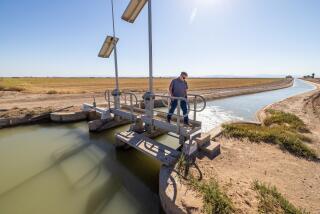Indian Claims to Water Divide Tribal Groups
- Share via
BISHOP, Calif. — Some things never seem to change in the Owens Valley. The wind, the giant leap of the Eastern Sierra peaks, the water feuds.
More than half a century after Los Angeles locked up the rights to every trickle of water it could squeeze from the valley 250 miles away, a handful of Paiute tribal groups insist some of that water belongs to them.
Years of off-and-on talks with the Los Angeles Department of Water and Power have yet to settle the matter, which has divided the Paiute community, prompted threats of litigation and given rise to appeals for more reservation land.
It is all rooted in a 1930s deal intended to solve what government officials then termed “the Owens Valley Indian problem.”
As Los Angeles took over more and more of the valley in the early 1900s, roughly 2,000 Indians were left living on scattered federal tracts. As the DWP bought up ranches to control their water rights, Indian jobs disappeared.
The answer, according to a 1937 report to the water and power board, was a plan “that would enable the Owens Valley Indians to be relocated upon good agricultural lands near or adjacent to the towns and main highways in order to provide them with a permanent method for success in the future.”
Three reservations were created at Bishop, Lone Pine and Big Pine with land the DWP gave the federal government in exchange for 2,913 federal acres on which the Indians had been living in outlying areas.
But under the 1939 land swap, water rights were excluded, leaving the DWP with control over water rights on the new reservations and the federal government with rights on what became DWP property.
More than 60 years later the reason is unclear. The tribes say it was understood that the water rights would later be exchanged, but that never happened because the city could not legally relinquish its rights without the approval of municipal voters.
Peter Kavounas, a legal and environmental manager for the DWP, says he is not aware of any plan to exchange the rights. Rather, based on some federal shares in a canal company the city had taken over, the DWP agreed to deliver a certain amount of water to the three reservations forever at no cost.
The water, some of it pumped from beneath the reservations and some flowing from DWP lines, was delivered. The rights issue lay dormant for decades.
Then in the early 1990s, tribal leaders say, an environmental document concluded that the Owens Valley Indians held no water rights. Some tribal members with long memories said “Oh yes, we do.”
So started an effort to assert the water rights, not just by the Lone Pine, Big Pine and Bishop reservations, but also by tribal groups at Independence and Benton, a tiny community near the Nevada border.
“We want a settlement that addresses the fact that Los Angeles has been using our water for decades,” said Rachel Joseph, chairwoman of the Lone Pine reservation. “We have to have additional water.”
More than 2,000 people live on the Big Pine, Lone Pine and Bishop reservations, which together cover 1,391 acres. Tribal leaders say they need more water for development and in some cases to replenish the ground water table.
They also want more acreage, saying the land swap was unfair because the DWP got more than twice the area from the federal government than it turned over to the reservations.
The acreage disparity was no secret when tribes approved the land exchange. The explanation at the time was that the new reservation land was better situated and more suited to agriculture than the parcels the Indians were leaving.
But the tribal groups, which are interested in expanding their reservations, have hired a consultant to evaluate the old tracts.
“We have pretty solid evidence that a lot of those lands were capable of being farmed,” said Albuquerque attorney Jim Cooney, who with colleague Susan Williams is representing the tribes. “We think L.A. got lands of much more value than the tribes got.”
No lawsuits have been filed in the matter, but they have not been ruled out.
Four years ago negotiations yielded a proposed agreement calling for the DWP to give the Indians another 4,350 acre-feet of water a year--enough to supply twice that many households. No land was included in the settlement, although the DWP appears willing to at least discuss land issues.
The agreement fell apart when several of the tribes failed to ratify it and feuding erupted.
The Benton and Ft. Independence bands, which have small reservations established early in the last century, have claimed a share in the disputed water rights because they say the 1939 land swap was made for the general benefit of Owens Valley Indians.
Lone Pine and Bishop disagree, insisting that the rights belong only to them and Big Pine. “It is our water,” said Monty Bengochia, chair of the Bishop tribe. “If you can prove membership [in our groups], you have title to the water.”
The dispute has become personal. Joseph Saulque, vice chairman of the Benton tribe, says he and his sister Rose Marie Saulque have been officially banned from the Bishop reservation.
When Ft. Independence and Benton representatives showed up for talks with the DWP more than a year ago, Saulque says, the other three tribes refused to sit down with them in the same meeting room.
But Saulque says he will go to federal court if necessary to fight for his group’s share in any water deal.
More to Read
Sign up for Essential California
The most important California stories and recommendations in your inbox every morning.
You may occasionally receive promotional content from the Los Angeles Times.














